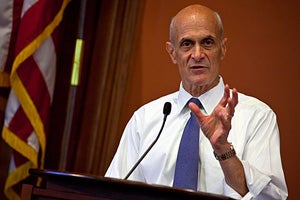Michael B. Chertoff ’78, who will be stepping down as secretary of the U.S. Department of Homeland Security next January when a new Presidential administration takes office, took time following a panel presentation in October to answer questions about his experiences on the job and his plans for the future.
Q. How have you seen al Qaeda change over your years in the agency?
“As we’ve removed senior people (in al Qaeda), they’ve evolved. They’ve done a lot more to try to recruit Westerners or people with Western backgrounds as a way to make it easier for them to get into the West—for example, using Europe as a platform to get into the U.S. As a consequence, we have put measures into place to make it harder for someone, even from Western Europe, to make it in if they’re a terrorist without our knowing it. We’re putting regulations into effect in a few months that will require travelers from Europe to give us some advance information about themselves before they come in rather than when they arrive. It’s a dynamic circumstance where we’re constantly increasing our degree of information and alertness in response to what we perceive as their efforts to retool and evolve to be more threatening.”
Q. Do you think the agency itself could change in any fundamental ways with a new administration?
“I doubt it. I think we’ve evolved and matured to the point where people recognize the real value of the agency. I think the next secretary and the next President will have an opportunity to take a deep breath. In the disputes and debates and arguments in this area over the last eight years, everybody’s positions have accumulated some baggage. So presumably, the next President will have an opportunity to say, ‘Let’s put some of the baggage behind us and take a look at some of these tough legal issues and decide if we can’t come up with a better consensus approach on some of these questions.”
Q. Are there important lessons that you’ve learned during your time as secretary?
“The most significant lesson is that if you do integrated planning with other agencies and other levels of government, your chances of succeeding in an emergency are much better. The second big lesson I’ve learned is that increasing public communication is a major operational factor in achieving success. Your ability to communicate what you’re doing to the public is not just a matter of having a good public image; it can actually be the ‘make it or break it’ in whether you can succeed because increasingly in the 21st century your ability to make something happen requires the cooperation of a lot of people. You can’t make them do it; they have to want to do it. That means you have to explain it and persuade them.”
Q. So what’s next for you after you leave the agency?
“I think I’m going to write and speak about some of my experiences. I’m going to go into private life and try to figure out what will be interesting and what might replenish some of the negative impact on my finances from the last several years.”
